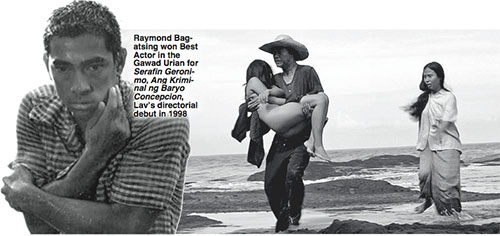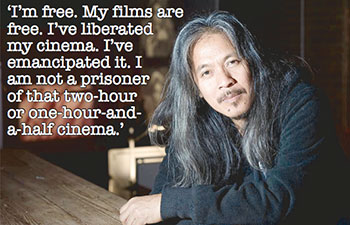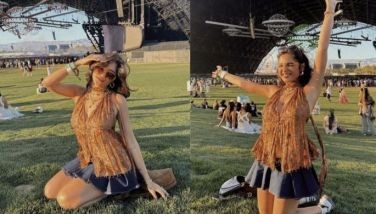Filmmaking with Lav

It’s getting to be an exhilarating routine, like the refrain of a love song that plays over and over again, and yet, like losing your innocence, when it happens it feels like the first time. He did it before, several times before, and when he does it again, we are happy for him and we vicariously share the weight of the new feather added to his already well-decorated cap.
All those words when all I want to say is that when Lav Diaz brings home yet another award from an international film festival, for Best Director or Best Film or for any of his actors, we smile in silent approval, “So what else is new?” Well, what would be new is if Lav didn’t win any award.
In the 16 years that he has been making movies, most of them running for hours and hours (bring as baon a lunchbox and some merienda, but don’t drink too much liquid so you won’t be going back and forth to the restroom and risk missing something), Lav created his own brand of cinema, all his own, radically changing the way and style films should be made.
He’s a product of Regal Matriarch Mother Lily Monteverde’s much-maligned pito-pito style (time has vindicated the plucky producer), wrapping the shoot in seven days (that’s how it got its name), taking a bow in 1998 with Serafin Geronimo, Ang Kriminal ng Baryo Concepcion (two hours and 20 minutes) which won a Gawad Urian Best Actor for Raymond Bagatsing. That started Lav’s winning streak that not just locally but also (mostly) internationally, to wit:
- 2001: Batang West Side (black and white, five hours). Best Asian Feature Film, Silver Screen Awards, Singapore International Film Festival; Best Picture/Best Actors (Joel Torre and Yul Servo), Brussels Film du Independent Festival.
- 2004: Ebolusyon ng Isang Pamilyang Pilipino (black and white,10 hours and 45 minutes). Best Picture, MOV International Film Festival; No. 6 among the Ten Best Films of the Decade listed by Cinema Scope Magazine in 2011.
- 2006: Heremias, Unang Aklat: Ang Alamat ng Prinsesang Bayawak (black and white, nine hours). Special Jury Prize, Fribourgh International Film Festival (Switzerland).
2007: Kagadanan sa Banwaan ning mga Engkanto (Death in the Land of Encantos, black and white, nine hours). Special Mention, Orizzonte Prize, 2008 Venice Film Festival, Italy; NETPAC Prize, Best Asian Feature/Silver Hanoman Prize, Best Picture, 2009 Jogja-NETPAC Asian Film Festival, Jakarta.
- 2008: Melancholia (digital, black and white, eight hours). Grand Prize, Orizzonti Prize, Venice Film Festival, Italy.
And the latest, of course, was last week at the 67th Locarno International Film Festival in Switzerland where his latest epic, Mula sa Kung Ano ang Noon (From What is Before, black and white, five hours and a half) bagged the coveted Golden Leopard (or Pardo d’oro), the Top Prize (that comes with 90,000 Swiss franc). Also bestowed with the Premio FIPRESCI, the Premio “L’ambiente e equalita di vita” and the Premio FICC/IFFS, and earlier for Hazel Orencio the Boccalino de Oro Independent Critics Award for Best Actress, the film revolves around the lives of poor villagers in one of the remotest regions of the Philippines before Martial Law was declared, loosely based on real events and characters, and which examines how an individual and collective psyche responds to extreme and mysterious changes in social and physical environment.
“The award is an unprecedented honor for our country,” said Briccio Santos, head of the Film Development Council of the Philippines (FDCP).
During the awards night, Lav told the Locarno press that he was dedicating the award to his father.
“He brought me Cinema,” said Lav. “He’s a cinema addict and he started this passion in me. For the Filipino people, it’s for them, for their struggle, and then I would like to dedicate it to all serious filmmakers in the world, to Pedro Costa, he’s my brother and I love his work, to Matias Pineiro, and to the makers of all the other films in the competition,” adding when asked if it was a victory of Slow Cinema over Fast Cinema, “Everything is Cinema for me, so I don’t want to label things.”
The following Conversation should help us better decipher the mind of this brilliant filmmaker (who expresses himself more eloquently visually than verbally) and likewise help us better appreciate his films.
Why do you make films that run for hours and hours? What’s the rationale behind it?
“I’m free. My films are free. I’ve liberated my cinema. I’ve emancipated it. I am not a prisoner of that two-hour or one-hour-and-a-half cinema. To confine my work on that market-imposed practice would be moronic. How dare I call myself an artist if I’m not even free with my canvas and brush? Why would I surrender my praxis to profit-making? Everybody knows that popcorn and coke are lethal. Why would I equate my cinema with bad cholesterol? I’m beyond that since Batang West Side.”
I notice you hire relatively new actors and bring out the best in them. How do you spot a talent? What criteria to do you use in casting your movies?
“All of us are actors. That premise shakes off the star-system culture pronto. It’s easy.”
People have been wondering if you do films with awards in mind at the expense of the commercial aspect.
“The only reason why I make films is that I really love cinema. I make films for cinema. An award and a so-called market are consequential. They happen because there’s my cinema. Festivals invite my films. Museums, galleries and institutions exhibit my films. Distributors handle my films. Award-giving bodies recognize my cinema. Critics and scholars discourse on my cinema. My only task is to create my own idea of greater cinema. There’s the emphasis — greater cinema. I want to push my cinema to that template.”
Describe your struggle to get to where you are now.
“Hard work. Lots of sacrifices.”
At what point in your life did it dawn on you that you wanted to be a filmmaker? What was the film instrumental in making you realize it?
“Music was my thing then. Alam kong magiging musikero ako, sigurado ako. Beatles music I heard on radio and the musicians in my village in Maguindanao gave me epiphany. I kept saying, ‘I want to do that, I want to be that.’ In 1975, during my first year in college, I started living inside theaters literally, I watched and watched cinema, paulit-ulit, doon ako natutulog, d’un ako nagtatago, and I remember two films that had me saying that line again. The Godfather and Maynila, Sa mga Kuko ng Liwanag.”
 Who are the filmmakers that you admire and what did you learn from them?
Who are the filmmakers that you admire and what did you learn from them?
“The early days, of course, there was Lino Brocka and Ishmael Bernal. The whole gamut actually as I practically ate cinema then; Chiquito, Dolphy, Fernando Poe Jr., the kung fu movies of Hong Kong, the spaghetti westerns, James Bond, even the bomba movies. I didn’t think of directors during those times. Nang lumaon, nang magkaisip ako, lumutang na lang ang issue ng paggawa ng pelikula. Ayun, may director pala, may kumpositor, may author. Siya pala ang gumagawa. I started paying attention. I started assuming that persona, the so-called maker or creator or god. I understood being. Cinema is being.”
Name 10 films that left a mark in your mind (and heart) and why.
“So many films really. I don’t have a Top 10, even a Top 100. But there are films that kept me going back akin to the guitar pieces that I would immediately play and float upstream once I get hold of the instrument. The works of Tarkovsky are a true Jerusalem and Mecca for me. In his works, it’s some kind of a pilgrimage always. It’s holy. You go there to seek your soul. Making cinema is more about the soul.”
How is your life/routine like when you’re making a movie?
“It’s a duality. I am alone and at the same time, I am part of a team. The struggle to achieve a vision is a solitary pursuit. To articulate the journey toward achieving the vision, particularly in cinema, you would need other hands.”
Does the routine alter the way you live, etc.?
“I live cinema. It’s part of my being. I’m a father, a grandfather, a lover and a filmmaker. It’s a continuum and a constellation.”
(E-mail reactions at [email protected]. You may also send your questions to [email protected].)
- Latest
- Trending
























 Exclusive
Exclusive




